| | In this edition: The startups tackling mineral supply chains, S. Africa suspends police chief, a cas͏ ͏ ͏ ͏ ͏ ͏ |
| |  | Africa |  |
| |
|
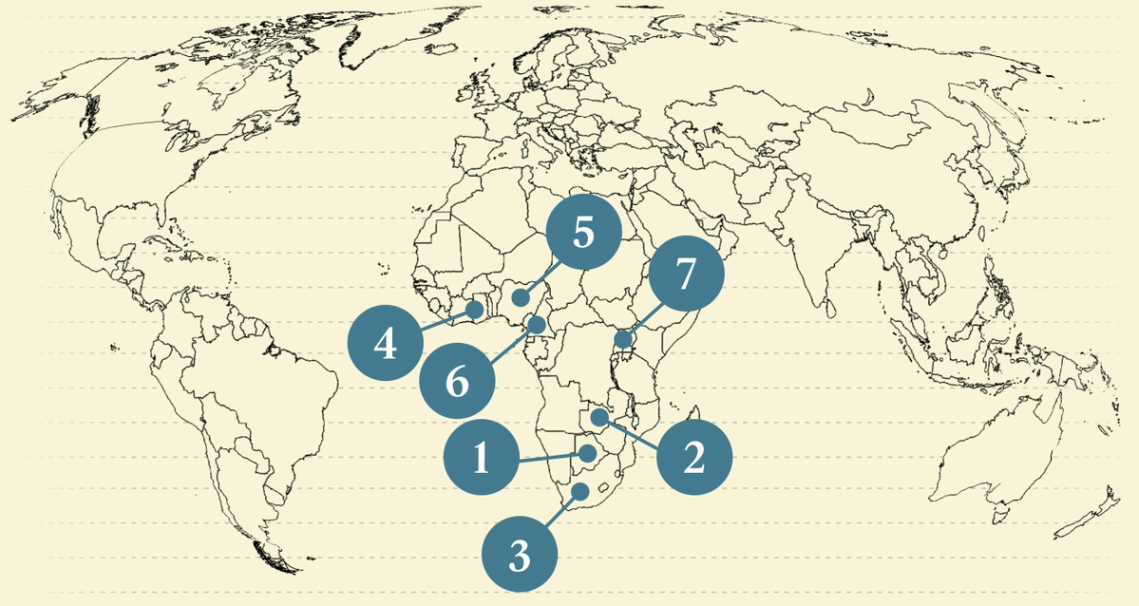 - Mineral tech startups
- Betting on Zambia’s copper
- S. Africa bars police chief
- A case for stablecoins
- Nigeria ex-president dies
- Biya runs for eighth term
- The Week Ahead
 A new book about a pioneering Mozambique artist. |
|
Startups working on mineral supply chains |
| |  | Olumuyiwa Olowogboyega |
| |
 Carlos Barria/File Photo/Reuters Carlos Barria/File Photo/ReutersA new wave of African entrepreneurs from software developers to industrial plant designers are looking to capitalize on a continental push to capture more value from natural resources. Companies from across Africa are offering services such as audit trails, compliance platforms, and data-backed logistics services. Lagos-based Sabi, for instance, initially focused on digitizing the back-end of informal retail but now uses its same software infrastructure to verify exports for commodities like lithium, cocoa, and sesame. And in Botswana, Kemcore is helping to cut cobalt refining delays by building modular chemical plants. None of these companies owns any mines or farms, but all seek to be indispensable in the next phase of Africa’s commodity supply chain story. |
|
Betting on copper in Zambia |
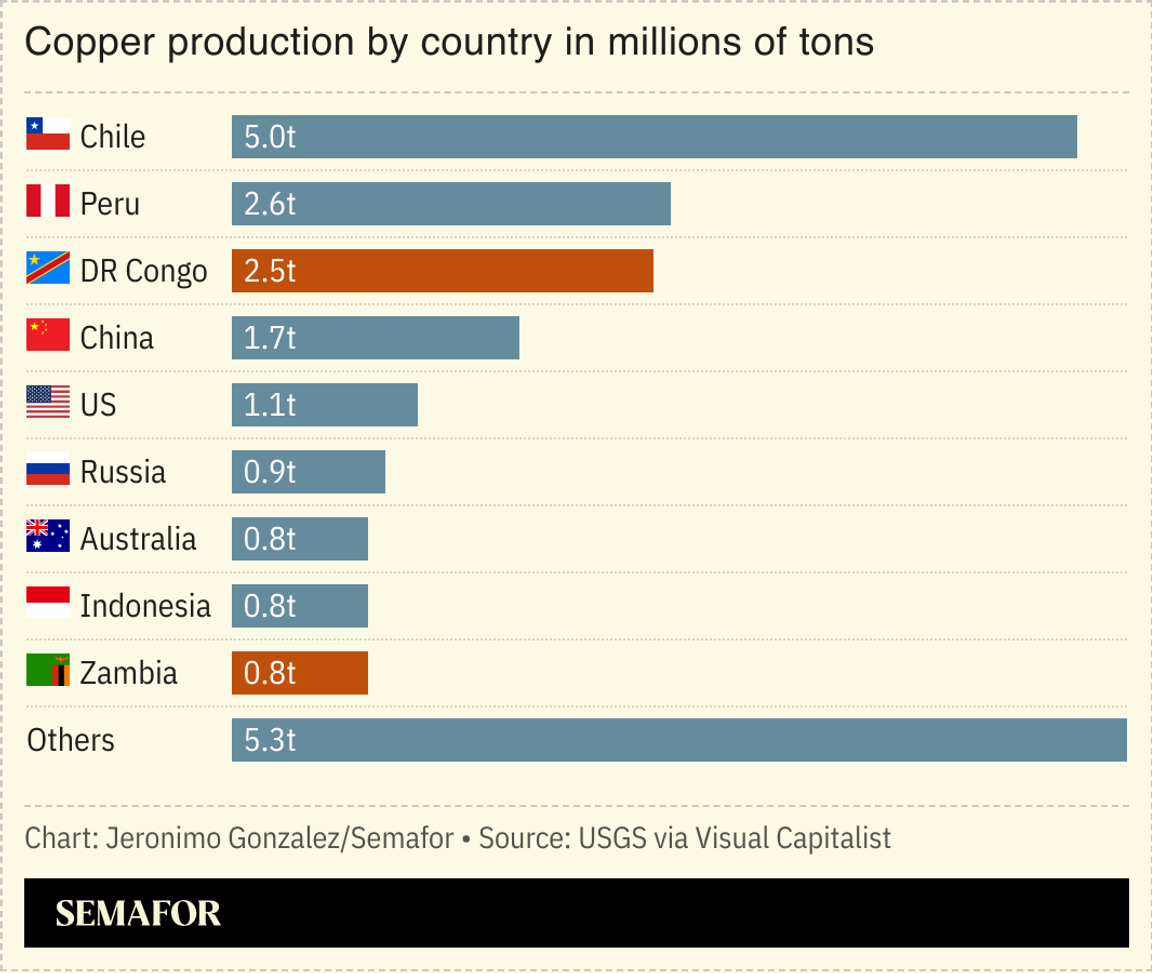 Canadian mining company Barrick is pushing ahead with a $2 billion expansion of its copper operations in Zambia, its CEO said, stressing his bullish stance on the metal’s prospects despite looming US tariffs. During a visit to Lusaka last week, Mark Bristow said the development of the company’s Lumwana site had put it “on course to join the world’s list of large and strategically important copper mines.” The plan seeks to double annual output at the site to 240,000 metric tons by 2028. US President Donald Trump on Wednesday said that he would impose a new 50% tariff on copper imports from Aug. 1 to promote domestic development of an industry that is critical to defense, electronics, and automobiles. Major copper producers such as DR Congo and Zambia could face price volatility due to tariff uncertainty which would affect export earnings. But Bristow said the long term outlook was unchanged. “Everyone is in agreement that the copper demand is outgrowing the supply side,” he said, pointing to growing demand for copper used in data centers and the move to clean energy. — Alexis Akwagyiram |
|
S. Africa suspends police chief |
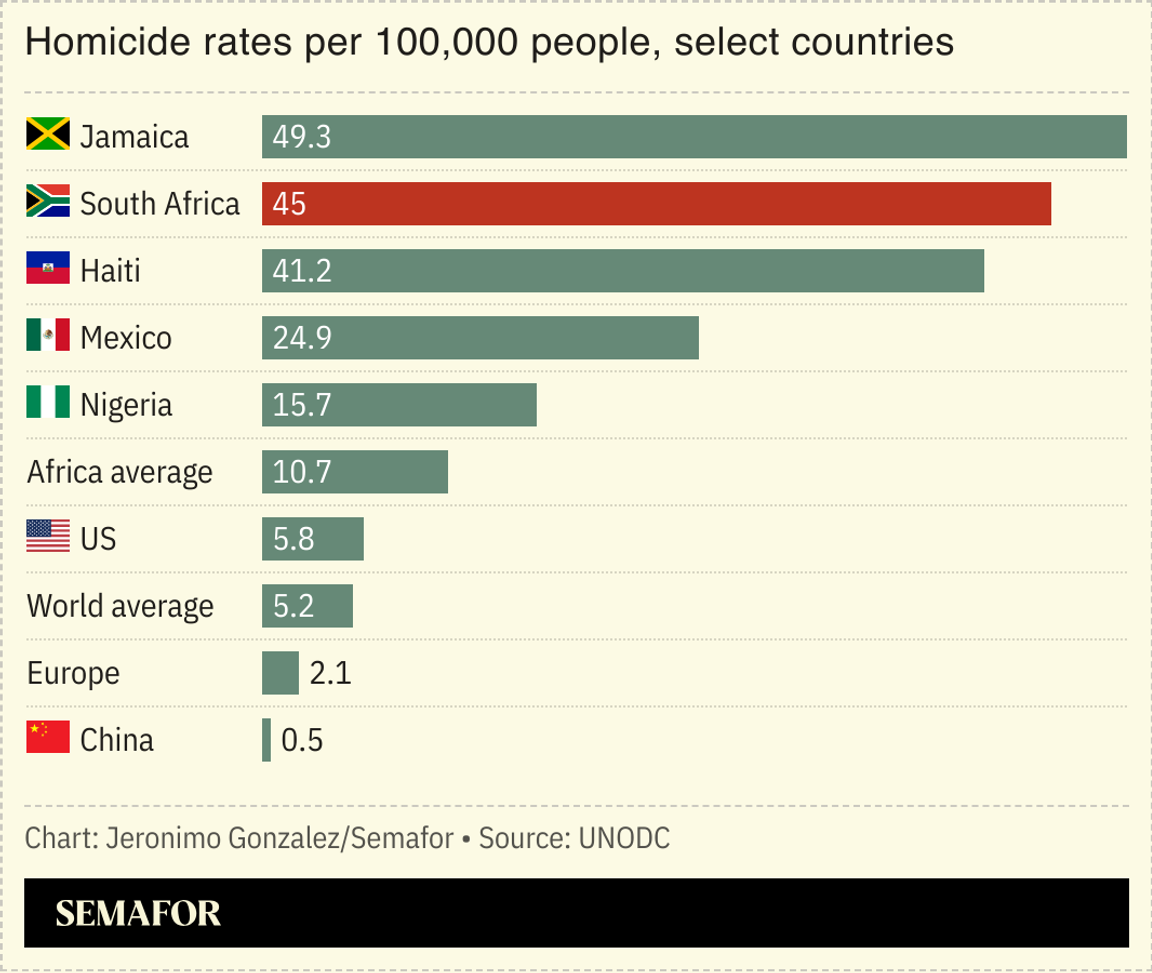 South Africa’s president suspended the country’s police chief over accusations of abuse and corruption, but the move failed to assuage allies who wanted a firmer response. The decision comes amid mounting frustration with the country’s law enforcement, which for decades has faced allegations of abuse — including thousands of cases of a still-prevalent torture mechanism used during apartheid — and yet failed to reduce crime. President Cyril Ramaphosa has “once again outsourced executive responsibility,” by getting a commission to look into the accusations, the leader of the ruling coalition’s second-biggest party said, while the Mail & Guardian’s editorial board lamented that if the latest allegations were true, “then there is no mistaking that we are living in a mafia state.” This item first appeared in Flagship, Semafor’s daily global affairs newsletter. Subscribe here. → |
|
|
Why Africa should pursue stablecoins |
 Wale Ayeni, managing partner of Helios Digital Ventures. Wale Ayeni, managing partner of Helios Digital Ventures.Africa’s emerging markets need their own local-currency stablecoins, a cryptocurrency investor argued in a column for Semafor. The digital tokens, pegged to currencies like the US dollar, could become “a vital tool for monetary resilience” on the continent, wrote Wale Ayeni, managing partner of the venture-capital fund Helios Digital Ventures. Ayeni, whose company has invested in stablecoin enterprises, says that the tokens, backed by short-term government debt, could deepen domestic capital markets and restore sovereign agency at a time when stablecoins are expanding into parts of the world typically underserved by traditional banking systems. “If these countries don’t move fast, they risk ceding monetary sovereignty as capital and control shift to decentralized systems,” he warned. |
|
Former Nigeria president dies |
 Sodiq Adelakun/Reuters Sodiq Adelakun/ReutersFormer Nigerian President Muhammadu Buhari died aged 82, leaving a mixed legacy. Buhari made history in 2015 by becoming the first Nigerian opposition candidate to defeat a sitting president in an election. The former general had previously ruled the West African country for about 18 months in the early 1980s as a military leader but lost three elections before defeating Goodluck Jonathan. Buhari went on to secure a second term in 2019 before leaving office two years ago. His electoral success stood in contrast to his record in office. Nigeria’s economy, the largest in Africa when he took the reins, fell into recession twice during his presidency and insecurity spread nationwide — from the Boko Haram insurgency to mass kidnappings and a resurgence of attacks on Niger Delta oil facilities. The violent quelling of mass protests against police brutality also prompted widespread criticism of his human rights record. Despite being a divisive figure, tributes have poured in since Buhari’s death was announced on Sunday. President Bola Tinubu hailed Buhari as “a patriot, a soldier, a statesman” who led with “quiet strength, profound integrity, and an unshakable belief in Nigeria’s potential.” — Alexis |
|
Biya runs for eighth term |
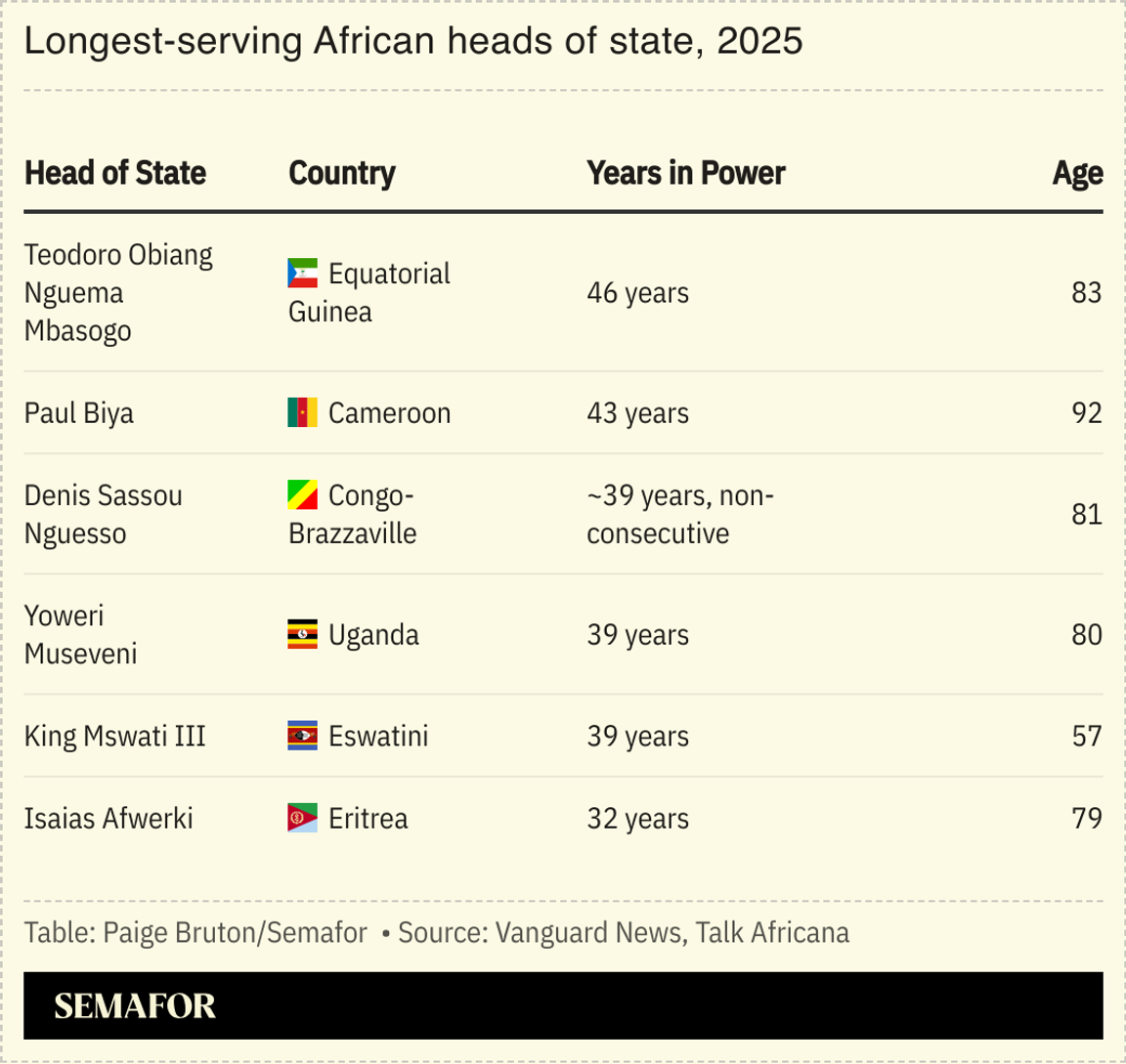 Cameroon’s 92-year-old President Paul Biya will seek an eighth term in October’s elections. The leader’s long stints outside the country and infrequent public appearances have prompted speculation about his health, but Sunday’s announcement on X confirmed his intention to stand again. The Central African nation, a major cocoa and oil producer, has in recent years grappled with a separatist conflict in its English-speaking regions and incursions from jihadist group Boko Haram in the north. Several opposition figures have said they will contest the election, including 2018 runner-up Maurice Kamto. Biya came to power nearly 43 years ago and scrapped term limits in 2008. His lengthy rule in a country with a median age of 19 is often cited in debates about the disparity between the continent’s youthful population and its elderly leaders. |
|
 - July 15-16: The Manufacturing Indaba takes place in Johannesburg.
- July 17-18: G20 finance ministers and central bank governors meet near Durban.
- July 17-20: The AVA Summit, an international conference advocating for the protection of farmed animals, convenes in Nairobi.
- July 18-19: RubyConf Africa, a gathering on open-source tech, is held in Nairobi.
- July 19: Zimbabwe plays Namibia in the Rugby Africa Cup final in Kampala.
|
|
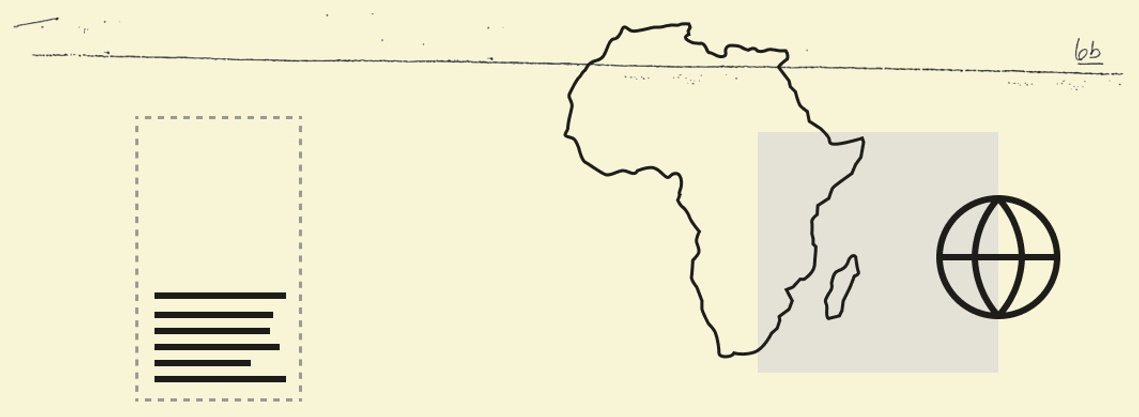 Business & Macro |
|
|